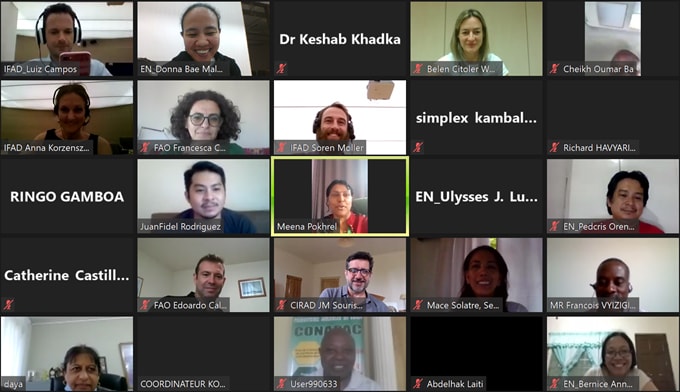
The Southeast Asian Regional Center for Graduate Study and Research in Agriculture (SEARCA) recently participated in the first Multi-Actor Global Exchange Meeting (GEM), co-organized by the International Fund for Agricultural Development (IFAD) and the Food and Agriculture Organization of the United Nations (FAO), for the development of a Modular Training Program on Public Policy Cycles for Family Farming (MTP). The MTP is the first global product that IFAD and FAO are currently developing in the framework of the United Nations Decade of Family Farming 2019-2028 (UNDFF). The MTP is intended to be a capacity development tool that will assist in the design, development, implementation, and review of context-specific public policies and investments to support family farming. It will mainly contribute to Pillar 1 of the UNDFF Global Action Plan (GAP), which aims to "Develop an enabling policy environment to strengthen family farming." The two-day GEM was held from 27-28 July 2020 via Zoom and was co-hosted by the IFAD and FAO head offices in Rome, Italy.
The GEM aimed to (1) present and discuss the preliminary structure and content of the MTP; (2) promote knowledge exchange between diverse actors from different regions on policy making processes and solutions for family farming, and identify needs and challenges; (3) collect preliminary inputs, contributions and feedback from development actors that can be used to further develop the content of the MTP; and (4) raise awareness about the MTP, create a community of practice, and identify potential users of the capacity development tool.
SEARCA has been commissioned by IFAD to undertake three (3) case study researches on public policies in Asia and the Pacific to develop a background document contributing to the development of the MTP. The case studies are simultaneously being conducted in the Philippines, Indonesia, and Vietnam. As one of the project's implementing partners, SEARCA was requested to share its experiences and insights on the public policy cycle in the GEM through a video interview with IFAD. Dr. Pedcris M. Orencio, Program Head of the Research and Thought Leadership Department (RTLD), represented the Center and discussed some of the most important policy-making challenges and interesting policy solutions and best practices adopted by the three countries under study. He also discussed how the conduct of such case study researches can help better understand the public policy cycle.
Dr. Orencio emphasized how the policy making process is often influenced by the vested interest of policy makers as well as the challenge of ensuring continuity of implementation as government administrations change, as in the case of Indonesia. The multi-stakeholder approach to policy making provides a way to ensure that the intended benefits of the policy are equitably distributed to its targeted beneficiaries, though this is a difficult mechanism to initiate and sustain as seen in the case of the Philippines. Moreover, policy making should be demand driven, yet competing demands and expectations from various stakeholders often make it difficult to strike a balance such as that between economic development and environmental sustainability, as in the case of Vietnam.
Given these challenges, some interesting solutions have been proposed and tested in the three countries. First is the creation of a third-party non-government organization knowledgeable on various policy issues to provide a check-and-balance mechanism for the government in Indonesia (e.g., NCFF/KNPK). Second is the conduct of hearings/consultations to engage representatives from various government and non-government agencies in the policy formulation stage to adopt a multi-stakeholder approach such as in the case of the Magna Carta of Small Farmers in the Philippines. And third, the adaption/reform of existing policies to changing socio-economic conditions such as the pressure of achieving sustainable development and international integration as seen in the case of Vietnam's "Tam Nong" policy.
The conduct of the case study researches under the project is a way to supplement the learning process about the public policy cycle on family farming. This approach will likewise provide a clearer perspective and understanding as to how an enabling policy environment for family farming in the region can be developed. The knowledge and evidences that will be gathered from these studies will also help identify best practices, as well as gaps and challenges, and present possible solutions/recommendations to improve the policies currently being implemented in the three countries.
The GEM was attended by representatives from various governments and other policy making bodies, global and regional organizations of family farmers, research institutions, and IFAD and FAO technical/policy experts. The SEARCA delegation was comprised of Dr. Orencio, Ms. Bernice Anne C. Darvin, Program Specialist, Ms. Donna Bae N. Malayang, Program Associate, and Ms. Ruth Jazrel M. Bandong, Project Associate, all from RTLD, Dr. Nova A. Ramos, Unit Head, Training for Development (T4D), and Dr. Aileen V. Lapitan, Country Case Consultant for the Philippines.